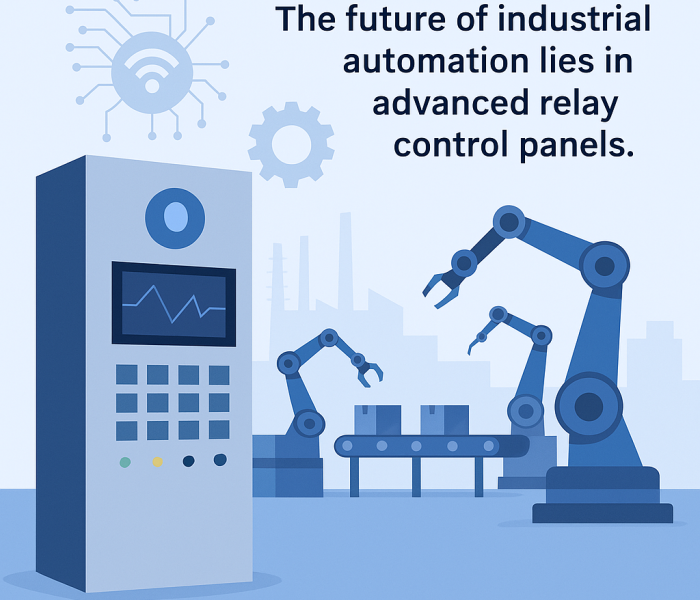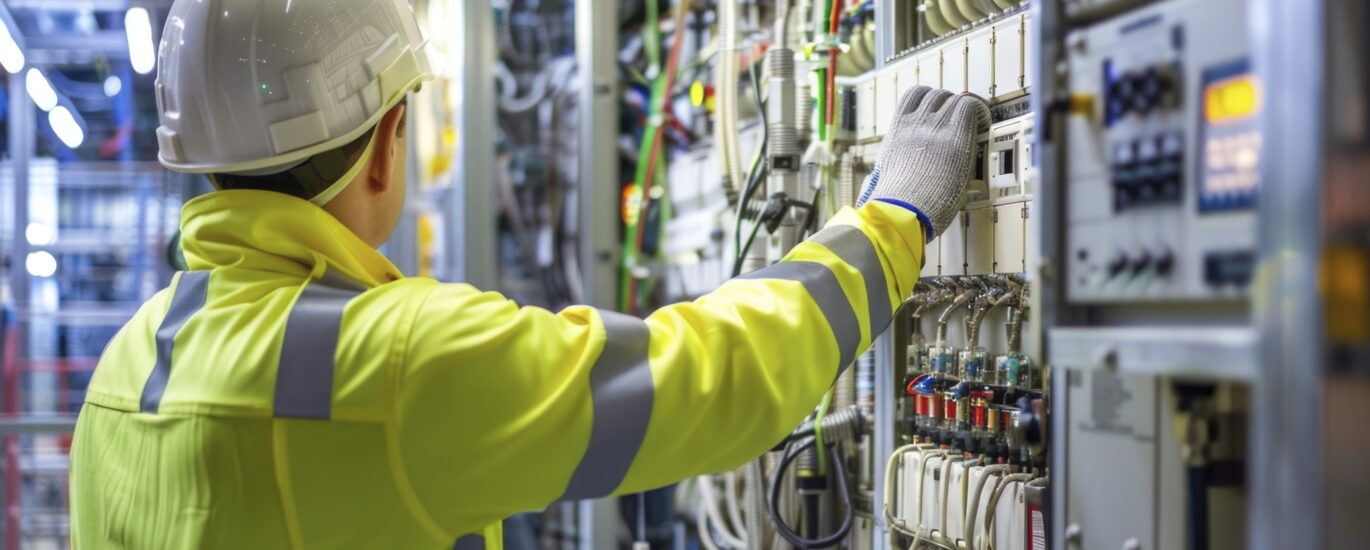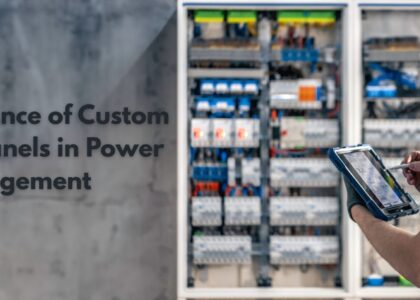Relay control panels are the backbone of industrial automation and power distribution systems. With rapid technological advancements, modern industries demand smarter, more efficient, and highly reliable control and relay solutions. These innovations enhance operational efficiency, reduce downtime, and ensure seamless integration with advanced monitoring systems. This blog explores the latest advancements in relay control panels and their impact on industrial efficiency.
Key Takeaways:
1. Emerging technologies are making relay control panels smarter, more efficient, and highly reliable.
2. IoT, AI, and cloud-based monitoring enhance real-time operations and predictive maintenance.
3. Compact designs and modular panels improve space utilization and system scalability.
4. Cybersecurity measures are increasingly crucial in protecting automated control systems.
5. Energy-efficient components help reduce power consumption and lower operational costs.
Table of Contents:
1. Introduction to Relay Control Panels
Relay control panels play a crucial role in industrial automation and electrical power systems. These panels manage and monitor electrical circuits, ensuring smooth operation, fault detection, and system protection. Traditionally, control & relay panels relied on manual monitoring and basic automation. However, with the growing demand for high-performance and energy-efficient solutions, industries are adopting advanced technologies to optimize their operations.
2. The Role of Relay Control Panels in Industries
Relay control panels are essential across various industries, including manufacturing, power generation, oil and gas, and transportation. Their primary functions include:
1. Protecting electrical systems from faults and overloads.
2. Automating industrial processes for increased efficiency.
3. Monitoring real-time data for proactive decision-making.
4. Enhancing safety by reducing manual intervention.
3. Key Innovations in Relay Control Panels
Smart Control Panels with IoT Integration
One of the most significant advancements in control and relay panels is the integration of the Internet of Things (IoT). IoT-enabled panels allow remote monitoring, real-time data analysis, and automated control. Industrial operators can now receive alerts, analyze performance metrics, and adjust settings from anywhere, improving operational efficiency and reducing downtime.
AI-Powered Predictive Maintenance
Artificial intelligence (AI) is transforming the way industries manage relay control panels. AI-driven predictive maintenance helps identify potential issues before they lead to system failures. Machine learning algorithms analyze historical data to predict component wear and suggest preventive measures, minimizing unplanned downtime and maintenance costs.
Advanced Communication Protocols
Modern relay control panels support multiple communication protocols, including Modbus, IEC 61850, and DNP3. These protocols enable seamless integration with SCADA (Supervisory Control and Data Acquisition) systems, enhancing real-time data exchange and improving overall system reliability.
Compact and Modular Panel Designs
With industries demanding space-saving solutions, modern relay control panels are becoming more compact and modular. Modular designs offer flexibility, making it easier to upgrade and expand systems without significant modifications. These panels also improve scalability, allowing industries to adapt to changing operational needs.
Cybersecurity in Control Systems
As industrial automation increases, so does the risk of cyber threats. Protecting relay control panels from cyberattacks is now a priority. Industries are implementing advanced encryption, multi-factor authentication, and firewalls to safeguard their control systems from unauthorized access and potential disruptions.
Energy Efficiency and Sustainability
Energy-efficient relay control panels help industries reduce power consumption and lower operational costs. Innovations such as smart power management, LED indicators, and low-energy components contribute to sustainability efforts. By integrating renewable energy sources, industries can further optimize energy usage and minimize environmental impact.
4. Impact of Advancements on Industrial Efficiency
The integration of advanced technologies into relay control panels has revolutionized industrial automation, enhancing performance, safety, and sustainability. Below is a detailed look at how these advancements are shaping modern industries.
Increased Reliability
Reliability is a cornerstone of industrial operations, and modern relay control panels have significantly improved in this regard. Traditional panels relied on periodic manual inspections, which increased the risk of undetected faults. However, the adoption of smart monitoring systems and predictive maintenance powered by AI and IoT ensures that potential issues are identified in real time.
For example, smart sensors continuously track performance metrics such as temperature, voltage fluctuations, and circuit integrity, sending alerts when anomalies occur. This proactive approach prevents system failures, reduces downtime, and enhances the overall operational efficiency of industrial plants, manufacturing units, and power grids.
Enhanced Safety
Industrial electrical systems are prone to risks such as overloads, short circuits, and power surges, which can cause severe damage to equipment and even endanger workers. With advancements in relay control panels, industries can now leverage automated fault detection, circuit breakers with real-time response, and advanced protection mechanisms to prevent electrical hazards.
Modern panels integrate intelligent trip mechanisms that instantly disconnect circuits in case of abnormalities, reducing the risk of fires, equipment malfunctions, and electrical shocks. Additionally, remote monitoring capabilities enable operators to manage electrical systems without direct physical intervention, further ensuring worker safety.
Operational Efficiency
Relay control panels equipped with automation and IoT capabilities have drastically improved industrial productivity and workflow optimization. IoT-enabled panels allow industries to:
Automate routine processes, reducing the need for manual operation.
Remotely monitor and adjust settings, improving response times to faults.
Analyze real-time performance metrics, enabling faster decision-making and improved production rates.
For instance, in manufacturing plants, automated control panels can synchronize machinery operations, ensuring seamless production with minimal human intervention. This not only improves output quality but also reduces labor costs and human errors.
Cost Savings
Industrial power management is a major factor in operational expenses, and outdated relay control panels often lead to unnecessary energy consumption and frequent maintenance costs. The introduction of energy-efficient components, smart power management systems, and predictive maintenance tools has significantly cut costs for industries.
Energy-efficient relay control panels use low-power circuits, LED indicators, and optimized power distribution to reduce energy wastage. Additionally, AI-driven predictive maintenance eliminates unexpected breakdowns and emergency repairs, saving industries from costly downtime and unplanned expenses. Over time, these cost reductions contribute to higher profitability and sustainability.
Scalability
Industries are continuously evolving, and the demand for scalable solutions has led to the development of modular relay control panel designs. Unlike traditional panels that require extensive rewiring for upgrades, modern panels are designed with plug-and-play modular units, making it easier for industries to expand operations without major modifications.
For example, a power plant or manufacturing facility experiencing increased production demands can simply add additional modules to the existing relay control system rather than replace the entire panel. This modular approach:
1. It saves on infrastructure costs by reducing the need for frequent replacements.
2. Allows easy integration with new technologies without disrupting existing systems.
3. It provides industries with flexibility, ensuring they remain competitive in a rapidly changing market.
Final Thoughts

The future of industrial automation lies in advanced relay control panels. With continuous innovations in IoT, AI, cybersecurity, and energy efficiency, industries can achieve higher productivity and seamless operations. Adopting these modern solutions ensures not only improved performance but also long-term sustainability and competitiveness in the evolving market.
Upgrade Your Industrial Power Systems with Advanced Relay Control Panels
Stay ahead in the industrial sector with state-of-the-art Control and Relay Panels from Digital Electric. Designed for seamless automation, enhanced safety, and efficient power management, our panels ensure precise control and protection for critical electrical systems.
Advanced automation for optimized operations
Reliable protection against electrical faults
Seamless integration with industrial setups
Built for durability and long-term performance
Enhance your industrial efficiency with Digital Electric’s cutting-edge Control and Relay Panels. For professional solutions catered to your needs, get in contact with us right now!
FAQs
What are control and relay panels used for?
Control and relay panels manage electrical circuits, protect systems from faults, and automate industrial processes for improved efficiency and safety.
How do IoT-enabled control panels improve industrial operations?
IoT integration allows remote monitoring, real-time data analysis, and automated control, reducing downtime and enhancing efficiency.
Why is predictive maintenance important in control panels?
Predictive maintenance uses AI to detect potential faults before they occur, minimizing unplanned downtime and maintenance costs.
How can cybersecurity protect control and relay panels?
Implementing encryption, firewalls, and multi-factor authentication helps prevent cyber threats and unauthorized access to control systems.
What are the benefits of modular control panel designs?
Modular designs improve scalability, making it easier to upgrade and expand systems without significant modifications.
How do advanced communication protocols improve relay control panel performance?
Modern relay control panels support protocols like Modbus, IEC 61850, and DNP3, enabling seamless integration with SCADA systems for real-time data exchange and improved system reliability.
What industries benefit the most from advanced relay control panels?
Industries such as power generation, manufacturing, oil & gas, transportation, and renewable energy rely on relay control panels for automation, system protection, and efficient operations.
How do energy-efficient relay control panels contribute to sustainability?
These panels reduce power consumption using smart power management, LED indicators, and low-energy components, helping industries lower operational costs and minimize environmental impact.
What role does automation play in modern control panels?
Automation enhances efficiency by reducing manual intervention, optimizing processes, and ensuring faster response times to electrical faults, ultimately improving industrial productivity.
What factors should industries consider when upgrading to advanced relay control panels?
Industries should assess factors such as scalability, integration capabilities, energy efficiency, cybersecurity features, and compliance with industry standards before upgrading their control panels.



